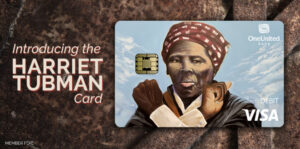
OneUnited Bank announced the release of its limited-edition Harriet Tubman Visa, Debit Card in celebration of Black History Month via Twitter on Feb. 13.
In a link that accompanied the viral post, the black-owned and operated trust company states that the premiere of the card is not only to honor her trailblazing legacy in the fight for emancipation but to also recognize the necessity for the leader to be officially placed on the federal currency.
Under the Obama administration, Treasury Secretary, Jack Lew, made fervent strides to reframe the narrative of who deserves recognition as a progenitor of our nation. Lew announced that the heralded abolitionist would replace Andrew Jackson as the face of the $20 bill in 2016. The ardent celebration of this history-making decision from intersectional feminists and the Black community was to no avail as the redesign process halted under Treasury Secretary, Steven Munich, of the Trump administration.
According to their webpage, OneUnited Bank believes Tubman deserves to be placed on the bill, but nevertheless they “have the power to place [her] on a global payment device.”
Many users on Twitter, however, were genuinely perplexed with the debit card that featured Miami-based artist, Adonnis Parker’s, artwork of Harriet Tubman in what appeared to be a Wakanda salute from Ryan Coogler’s “Black Panther.”
Twitter user @eugenegu tweeted, “Let me guess. A white marketing executive from Beverly Hills came up with the idea of a Harriet Tubman Visa Debit Card doing the Wakanda Forever Salute.”
To abate the concerns of the public, the bank’s Twitter account clarified that the Underground Railroad conductor’s gesture was, in fact, the sign language symbol for love, and not an allusion to the fictional African land.
The rendition of Tubman’s portrait may have initially been representative of her sacrificial love, but it is hard to grasp that the company’s marketing strategists overlooked the resemblance to the culturally acclaimed film and its familiarity to their niche audience.
Rightfully so, the African-American community ruled the debit card as clearly pandering on their purchasing power. Even if the skeptical ulterior motives are disregarded, it would be remiss for the Black community to not ignite a social media upset on what adds to the recurring historically inaccurate representation of Tubman’s legacy.
In 2018, a post circulating online, credited the famed abolitionist to a phrase that says, “I freed a thousand slaves. I could’ve freed a thousand more if only they knew they were slaves.” The quote was even referenced in a now-deleted tweet by Kanye West to controversially associate Tubman with his polarizing stance that slavery was a “choice.” After gaining quite the social media traction, the quote was rendered false by the Associated Press.
Even when it comes to her perilous journey, the National Park Service have credited her for freeing over 300 slaves, while expert historians have now narrowed the number to between 70 to 90 slaves.
The general belief in both the falsely attributed quote and statistics indicates how we continue to glamorize Tubman’s legacy to fit our narrative.
Tubman was not a swift-tongued woman who felt that the enslaved were content in their servitude. She does not need her travel to freedom misconstrued to amplify her heroism nor does she need a fictional salute to Wakanda to validate her valor.
From serving as a Civil War scout to being an activist in the woman suffrage movement, her bravery speaks for itself and we do her a disservice by warping her legacy for our content.